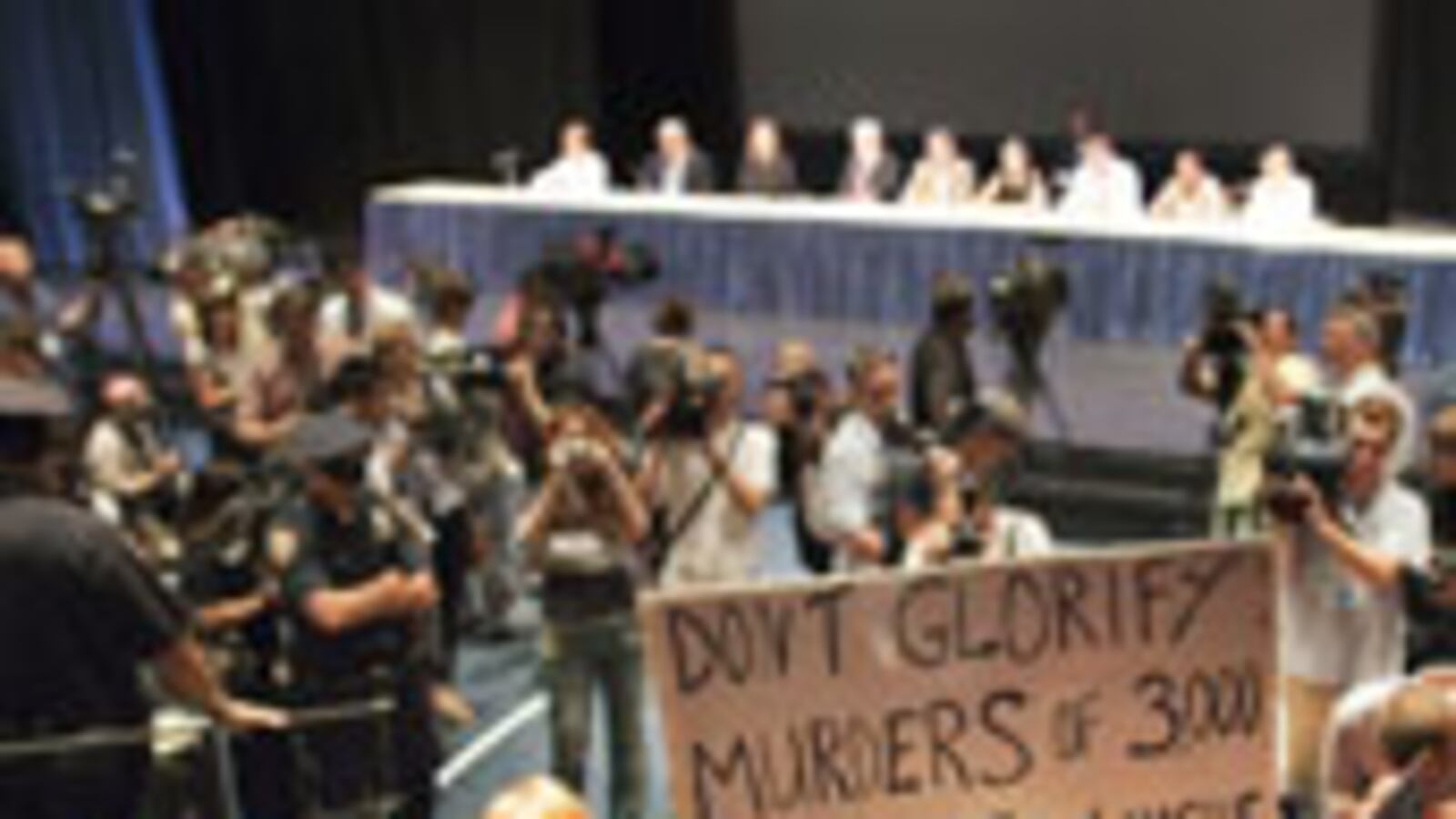I suppose I take the idiot idealist's position of what has come to be known as the Ground Zero mosque (even though, it has been pointed out repeatedly, the description is not accurate), which is pretty much what Mayor Michael Bloomberg laid out in his speech on Governor's Island Tuesday: We ought to be better than the worst thing that happened to us, and if a Muslim group comes to us in peace, we must accept the gesture or—here it comes—the terrorists win.
If something goes wrong later on—if members of the American Muslim community turn out to be bad actors—we have our warm reception of Cordoba House to hold up as evidence of our goodwill.
Sharif El-Gamal, developer of the Ground Zero mosque, defends it in an interview with NY1.
This is pretty typical of the incredible and irrational sentiments that have attached themselves to what is officially known as Cordoba House. What has not been pointed out in response to that specious argument is that the opponents are not simply being inflammatory when they refer to it mostly as a phenomenon of geography: Obviously, the idea was to build an Islamic center near the 9/11 site—that it's in fact closer to the Burlington Coat Factory is kind of a cute point, but not convincing. So let's, at the very least, deal with Cordoba for what it is: an attempt by moderate Muslims to be part of this miserable legacy, because, as they want us to know, they are loyal Americans, too.
Given that this is the premise, it's odd that the whole Islamophobic crowd—the Fox News hysterics, the Palinolithics, the various Cheneys, the assorted terror mongers—doesn't welcome Cordoba House for the kinds of cynical, obnoxious reasons that any savvy political player would instantly recognize: Which is to say, if the people behind Cordoba really are so dangerous, then for heaven's sake, keep your friends close and your enemies closer.
If the destroyers of civilization—which is what many believe Muslims to be—come to you with irenic intent, insisting that they want to pay homage and honor to a disaster caused by the evildoers of their own kind, it strikes me as a good idea to just work with them. Not because you like them or agree with, but because they are here and that's that, and it seems that when they are trying to be decent, the wisest move is to respond in kind. That way, if something goes wrong later on—if members of the American Muslim community turn out to be bad actors—we have our warm reception of Cordoba House to hold up as evidence of our goodwill. It's a bargaining chip.
Basically, if everyone thought of this a bit more as realpolitik and a bit less as an existential crisis—which it is not; the United States will be just fine—this would all be less complicated. Obviously, the Jewish mayor of New York City and the Jewish borough president of Manhattan—both of whom are supporters of Cordoba—have adopted that stance, so I am not sure why an assortment of people who don't live here can't manage it.
One of the especially nice things about New York is that Jews, Muslims, and life's whole ridiculous assortment of crazies all live together quite comfortably. The particular offense of the attacks of 9/11 was that it brought religious tension to a city—possibly to a whole country—that simply did not have that particular problem. When I got to law school in 2004, I befriended many Muslim-American students—a lot of them were the children of pediatricians in Grosse Point or cardiologists in Short Hills, and they mostly reminded me of suburban Jews I'd known—who had a sudden interest in the legal system after being so frequently targeted for extra security checks in airports. I generally found that talking to any of them about the Middle East—or a zillion other highly caffeinated topics—was a far calmer experience than any conversation I could possibly have with, say, a typical European ideologue who has an anti-Israel reflex and no sense of history. That was never the case with my classmates, who were informed and who had nuanced views of the Islamic world. It came down to this: They're American. They live here.
I'm surprised that American exceptionalism hasn't taught people opposing Cordoba something about the process of joining this society. The United States has been defined by its ability to integrate immigrants, and turn them into Americans. Every wave of migrants from every part of the world has managed to find its place here, while still maintaining its ethnic identity. This is not something that happens in, say Europe, where women from Saudi Arabia living in London never give up their burqas, and where Algerians in the cities outside Paris riot because after generations they still don't feel French.
But the American Dream is such a pretty windmill to chase that it's not a problem to get new arrivals to join in the pursuit. People come here, they start watching The Real Housewives of New Jersey, they start reading vampire novels, they start eating Chicken McNuggets—it takes very little time for them to become soft and stupid like the rest of us. This country does not routinely produce radicals; numbskulls, maybe.
So I'm not scared of Cordoba House, with or without its Wahabi backers. Yes, of course, there will be Muslim extremists, some of them even from the United States, as we have already seen. There will be trouble. Whether or not there's a Cordoba House, there will be trouble. So we can welcome the Ground Zero mosque for all the right and good reasons—or we can welcome it because it's good strategy. Nothing wrong with that: New York City was built on people doing the right thing for the wrong reason.
Elizabeth Wurtzel is author of Prozac Nation, Bitch: In Praise of Difficult Women , and More, Now, Again . She has been popular music critic for the New Yorker and New York magazine, and the film reviewer for Nerve.






